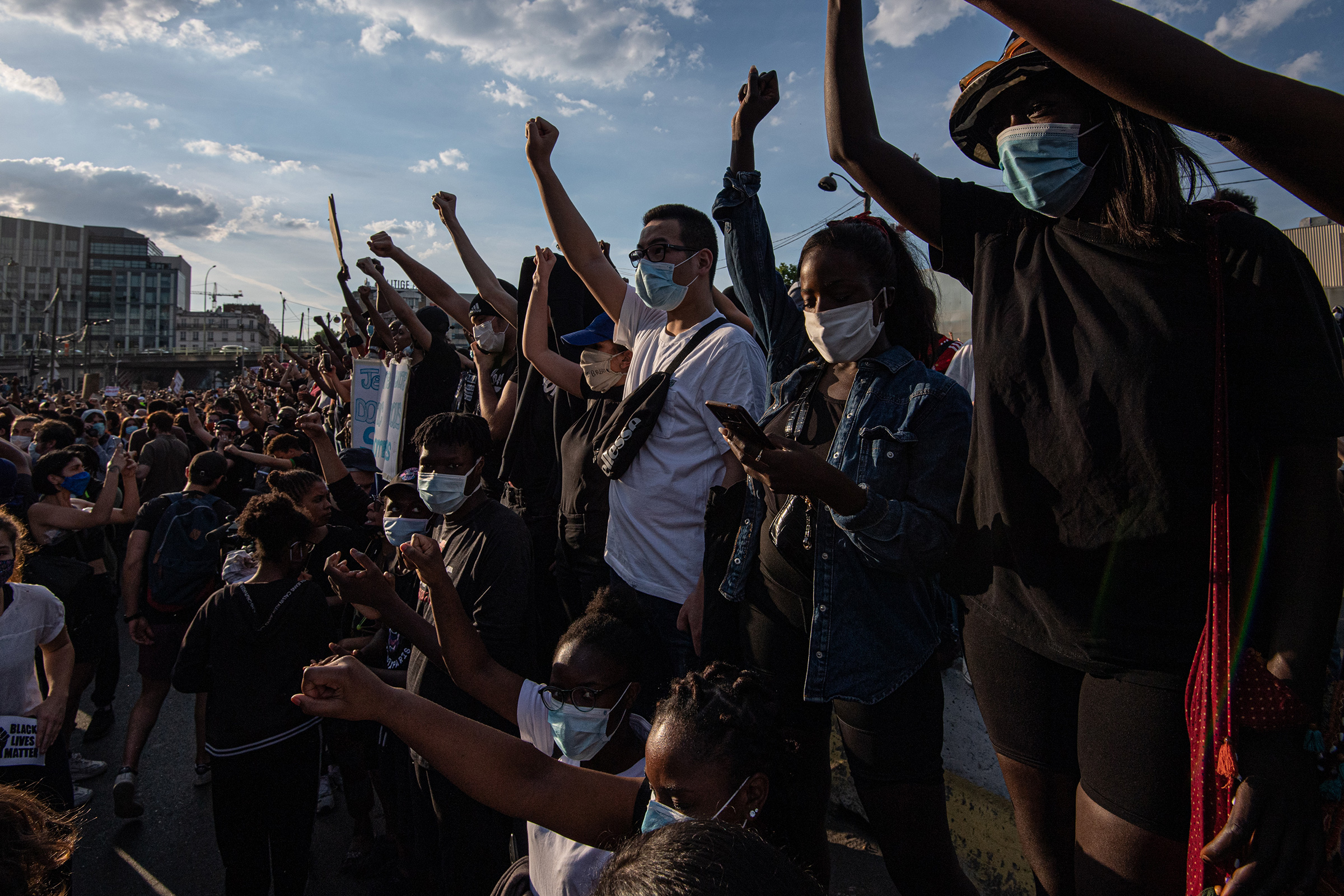
Some 20,000 people in Paris defied a ban against public gathering on Tuesday to protest the death of Adama Traoré, a black man who died at the hands of police officers in 2016. The protests were sparked after an independent probe commissioned by Traoré’s family was finally released on Tuesday; it found that his death was caused by the violent arrest by police forces.
Protesters, who also gathered in Marseille, Lyon and Lille, held up signs in English and French that read, “I can’t breathe” and “Black Lives Matter.” They called upon leaders to bring an end to police brutality. More protests are planned for Saturday, according to posts on social media.
The demonstrations go beyond solidarity with American protesters, who have been gathering since George Floyd was killed on May 25. “These protests are not just a response to what is happening in the United States. [They are] a response to Traoré, to police violence that took place during the lockdown and to the history of brutality at the hands of officers in France,” says Mathieu Rigouste, author of La Domination Policière, a 2012 book that argues current French police practices are rooted in the colonial era.
It’s no surprise that police brutality in the U.S. resonates with minorities in France, who are demanding accountability and transparency.“Today we are not just talking about the fight of the Traoré family. It’s the fight for everyone. When we fight for George Floyd, we fight for Adama Traore,” his sister, Assa said, who organized the protest.
According to a report by the independent authority in charge of human rights in France, young Arab and black men are 20 times more likely to be stopped than their white counterparts. While there are no official statistics on how many fatalities are caused by police brutality, some estimates suggest that the number has doubled in the past five years, with an average of 25 to 35 deaths a year. In 2019, the number of investigations into police violence opened by the Inspection générale de la Police National—the official police watchdog—increased by 20%.
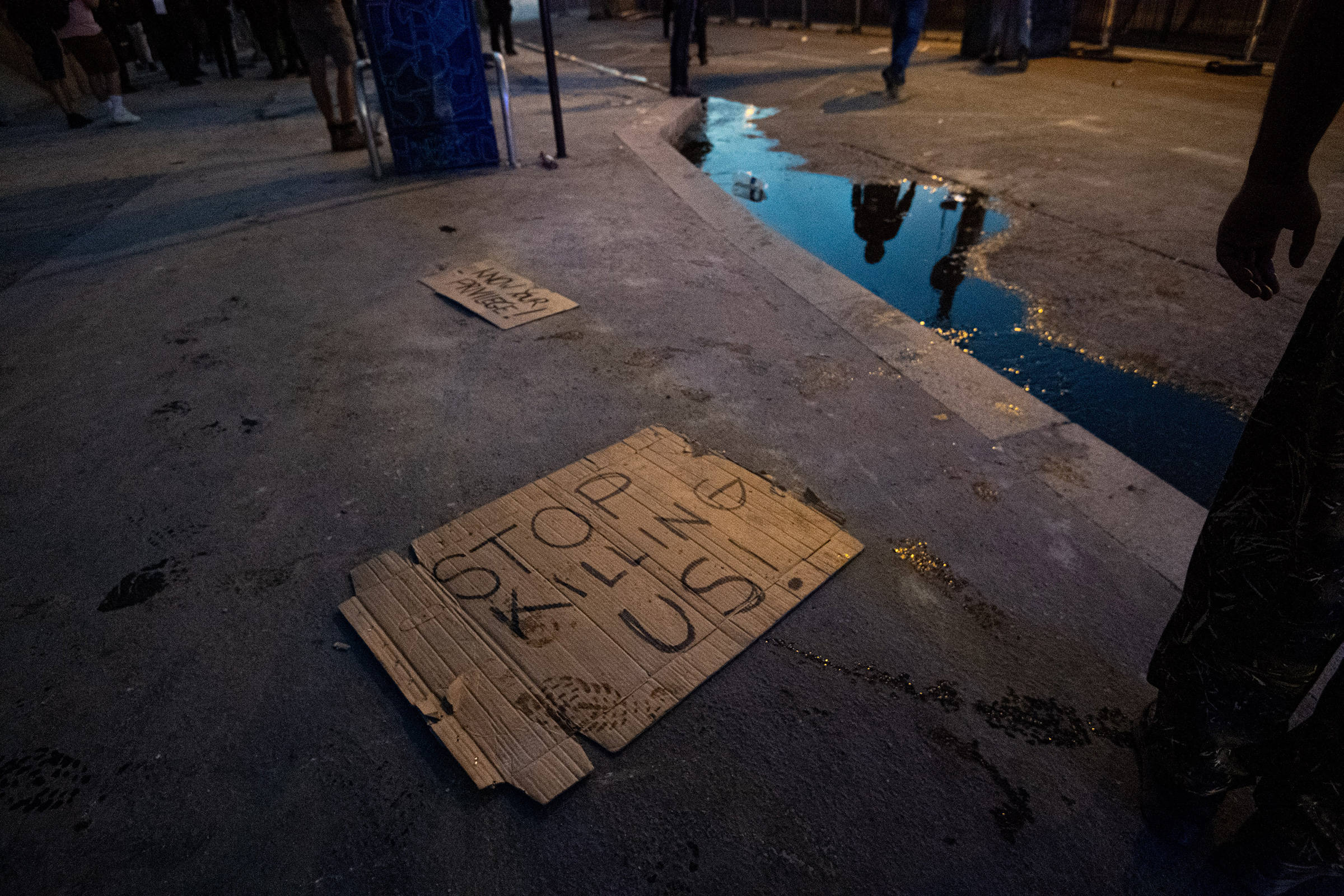
Although France experiences far fewer fatal police shootings compared to the United States, France has taken comparatively few steps to combat police brutality. In France, citizens can be subject to legal action if they take video footage of police officers and politicians continue to debate whether racialized policing is even a problem. On Wednesday, a spokesperson for President Emmanuel Macron’s government, Sibeth Ndiaye, said “I don’t believe we can say that France is a racist country.” She added that the United States and France are “not at all comparable … not historically, nor in the way our societies are organized.”
But many protesters and experts disagree. “Both the United States and France are societies that are capitalist, racist and patriarchal,” says Rigouste. “They are constructed around this.”
Here’s more on the current protests and the history of police brutality in France.
Who was Adama Traoré?
Adama Traoré was a French-Malian man who died in police custody on July 19, 2016 after a brutal arrest.
Traoré was out celebrating his 24th birthday with his older brother Bagui in Beaumont-sur-Oise, a town north of Paris, when both men were stopped by two undercover police officers. Traoré did not have his papers on him and was fearful officers would bring him to the station for lengthy checks, according to his family, and ran to a nearby apartment. When the three police officers entered the apartment, they say they jumped on Traoré. Although one officer says he and his colleagues only used “necessary force,” he said that the three of them had their body weight on Traoré’s back. Witnesses said Traoré did not resist the arrest. Unable to breathe properly under such pressure, Traoré said to the officers “I can’t breathe.”
By the time Traoré was put in a police car, he was fainting and urinating. While officers say they placed him in the recovery position, firefighters who were called to the station for medical assistance say they found him face-down, with no one helping him. France’s emergency medical services declared Traoré dead by 7 p.m.
It was only around 10 p.m., three hours after his death, that Traoré’s family was given the news of his death. (They say one officer had assured them he was fine, and another told them Traoré was in the hospital.) When his mother and brothers became emotional, they say police used teargas to disperse them.
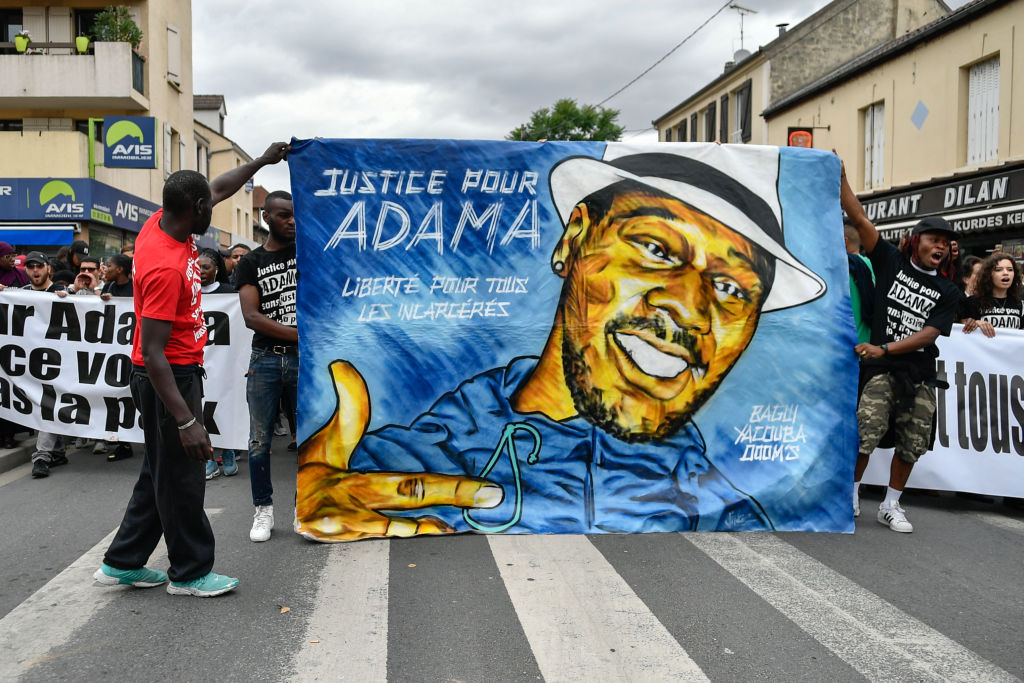
The exact circumstances surrounding Traoré’s death are the subject of an on-going battle between the French authorities and Traoré’s family and activists who allege there was a state cover up. An initial autopsy concluded that Traoré died of a heart attack and a serious blood infection. But many, especially Traoré’s family, were skeptical of the report, given that Traoré had no preexisting medical conditions. Suspicions grew when authorities allegedly offered to send the body to Mali for a burial and to provide passports to relatives that did not have one. The family asked for a second autopsy, which found that asphyxiation was the direct cause of death. But the three doctors overseeing the investigation said the suffocation was caused by a cardiac anomaly and insisted that violence was not the cause.
Why are protests happening now?
Two days after protests erupted on May 26 in Minneapolis following the death of George Floyd, the officers in France who arrested Traoré were exonerated by a medical report ordered by the judge in charge of the case. On Tuesday, June 2, an independent autopsy ordered by the family concluded that Traoré’s death was caused by arrest techniques.
Traoré’s sister Assa, a 35-year-old teacher, called for protests to take place on Tuesday in front of the courthouse of Paris’ 17th arrondissement. “What is happening in the United States has today brought to light what is happening in France,” Assa, Traoré’s sister, said to protesters. “We need to end the racism that is happening here in France.”
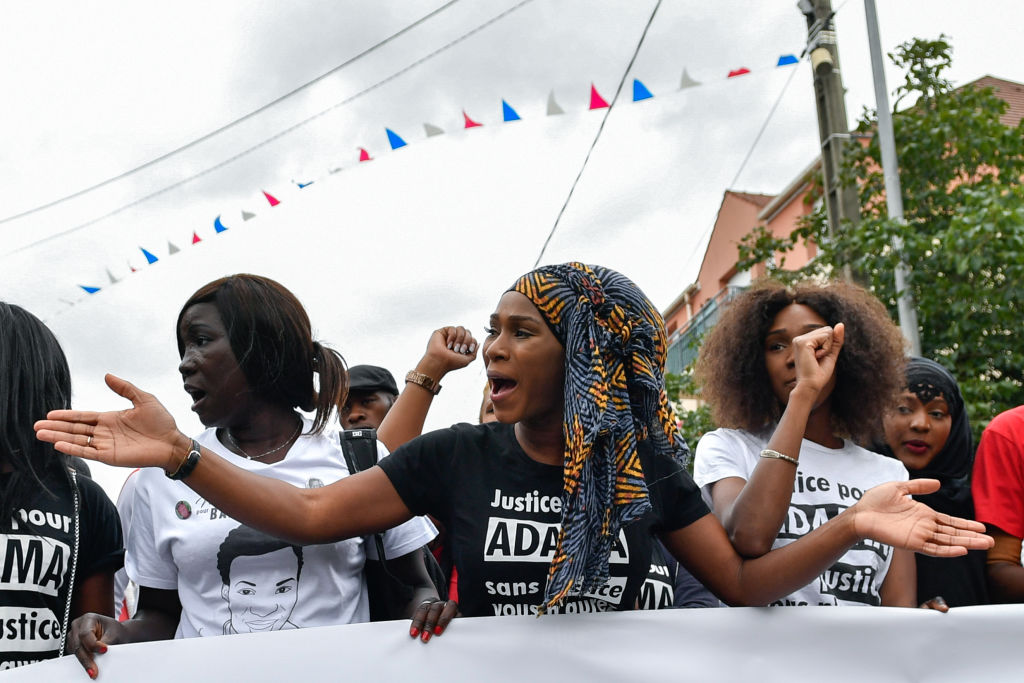
Over 20,000 people joined the march in North-East Paris according to the police, while organizers put the number at 40,000. Protesters carried signs with “Black Lives Matter,” the names of George Floyd and Adama Traoré, and the words “I can’t breathe,” pointing to the similar technique that killed both men.
“[The protests] are a way to remind ourselves what French history rests on—colonialism and slave trade,” says Hajer, 28 year-old protester, who asked TIME to only use her first name for professional reasons. “We cannot start anew if we don’t address these problems.”
What is the history of police brutality in France?
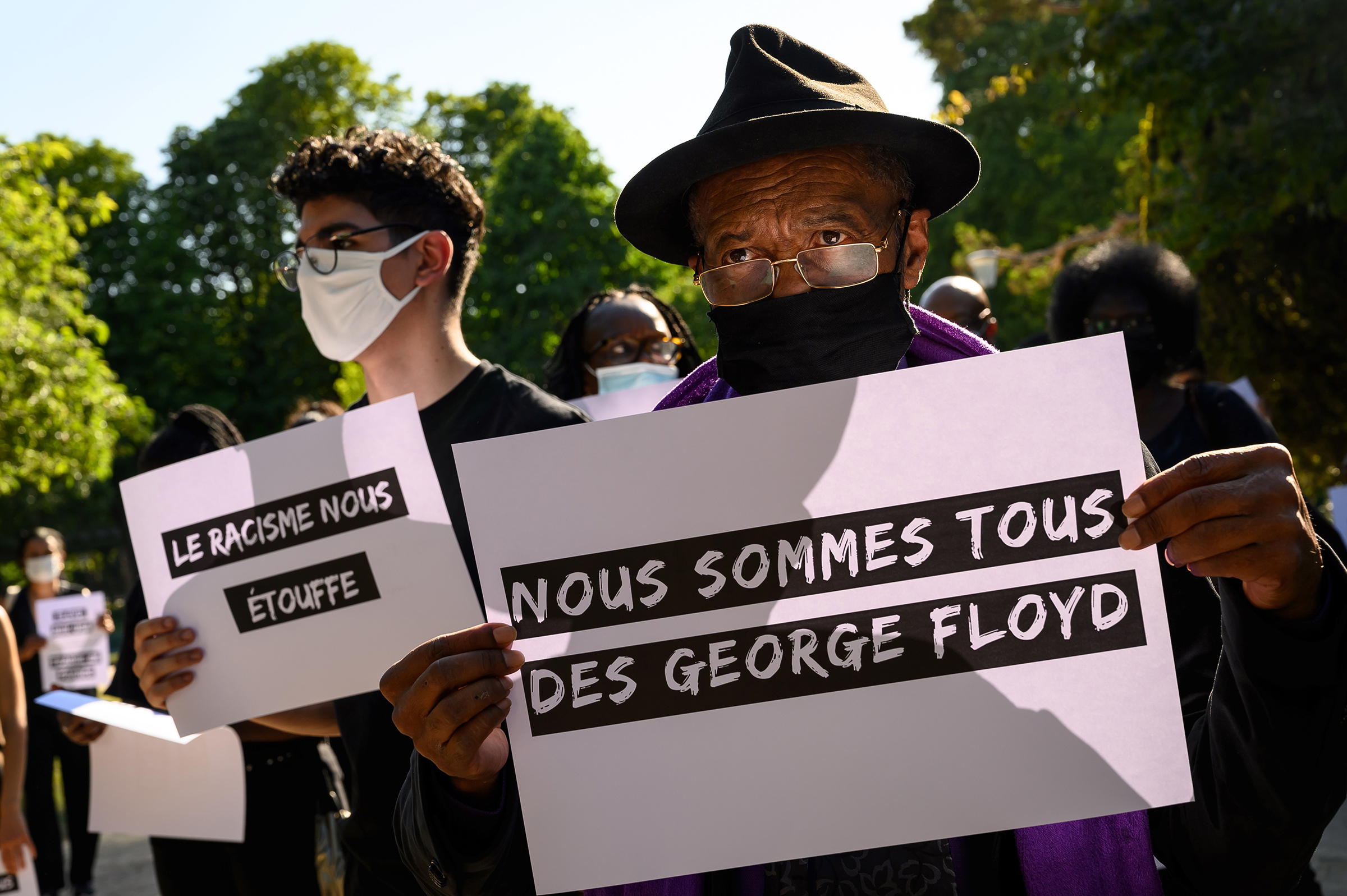
There’s a long history of police brutality against France’s black and Arab populations, activists say.
Since the 1970s, activist organizations such as the Arab Workers’ Movement have called out racist forms of policing. But police abuses have continued. “There is an extension of police violence that increasingly touches everyone,” says Rigouste. “But it is used more harshly against certain populations, especially people of color and poorer populations that are segregated.”
In 2005, Bouna Traoré, 15, and Zyed Benna, 17, were electrocuted when they ran into an electricity substation in a Parisian suburb after being chased by the police. A third boy, Muhittin Altun, survived but suffered major burns. The incident set off demonstrations across France, with protestors drawing attention to police brutality and inequality for people living in poorer suburbs. Vehicles and buildings were set on fire and thousands of protestors were arrested. The protests led President Jacques Chirac to call a state of emergency for the first time in 20 years. It lasted three weeks. In 2015, the officers—Sebastien Gaillemin and Stephanie Klein—were cleared of charges.
Police brutality in France has been called out by both national and international human right organizations. France was the first European Union country found to be guilty of torture by the European Courts of Human Rights in 1999 for the French police’s treatment of Ahmed Selmouni, who was beaten and sexually assaulted by police officers during questioning in 1991.
In 2009, Amnesty International warned of “a pattern of de facto impunity” among French police officers. Although France prohibits the collection of data based on ethnicity—making it difficult to identify patterns of racial profiling—the Défenseur des droits, a non-governmental French institution charged with protecting the right of citizens, released a report in 2017 that denounced practices of racial profiling. Last year, Michelle Bachelet, the United Nations High Commissioner for Human Rights called for a “full investigation” into the excessive use of force by French police officers.
Recent cases of police violence have brought the issue into the mainstream. In 2015, Remi Fraisse, a 21-year-old white environmental activist, was killed by a grenade thrown by the National Gendarmerie while protesting the construction of a dam. When the Yellow Vest movement erupted in November 2018—and people took to the streets to express a general discontent with their decreasing living standards—police brutality resulted in the loss of 24 eyes and five hands, 315 head injuries and two deaths, according to a 2019 investigation by French journal MediaPart.
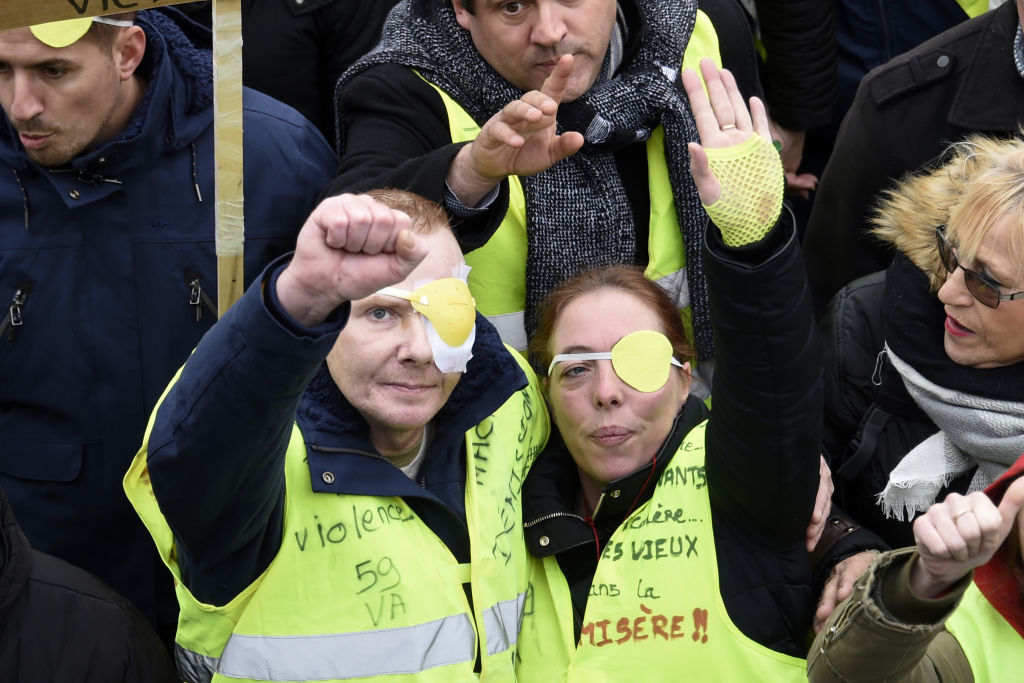
In January of this year, Cedric Chouviat, a 42-year-old delivery driver died after police held him to the ground in Paris. That same month, French President Emmanuel Macron said that he expects “the greatest ethics from our police officers and gendarmes,” after asking the government to develop a proposal for how to improve the code of ethics for officers. But he added that he did not want to “harm the credibility and dignity” of officers. A few months later, on March 8, young feminist activists marching on International Women’s Day were attacked by police and dragged down steps by their hair.
For some, the latest protests suggest awareness about police brutality and racism in France is growing — and they are cautiously optimistic. “There have already been big movements that gathered a lot of people but nothing changed,” says Hajer. “What counts for me is that a lot of people who used to not come out, now are. People who did not speak up before, now speak out.”
How has the COVID-19 pandemic affected the situation?
The protests follow a series of violent incidents by police officers enforcing lockdown measures. France implemented a strict lockdown on March 17 to curb the spread of COVID-19. Over 160,000 police officers were deployed to ensure that the lockdown was respected. (Lockdown measures began to be eased on May 11 with some schools and businesses opening and fewer restrictions on movements.)
Videos of heavy police presence in poorer neighbourhoods and a disproportionate use of force targeting the black and Arab communities flooded social media. In one video, police officers painfully hold Sofiane Naoufel El Allaki, a 21-year-old Amazon worker, on the ground for having forgotten his mandatory lockdown release form. Naoufel El Allaki said he suffered post-traumatic stress disorder as a result and has asked the police watchdog organization to open an investigation.
Police brutality became an even bigger topic of discussion when artist Camelia Jordana said black and Arab people are being “massacred” by police officers during lockdown on a TV show on May 23. Christophe Castaner, the French Minister of the Interior took to Twitter, calling Jordana’s words “untruthful and shameful” and a police union filed a complaint against the singer.
But Assa Traoré amplified Jordana’s message by launching #MoiAussiJ’AiPeurDevantLaPolice (I am also afraid in front of the police) on Twitter, where users shared their instances of police brutality on social media.
“It is in these forms of resistance that there is hope,” Rigouste says. “There is another society being born in this resistance.”
More Must-Reads from TIME
- Cybersecurity Experts Are Sounding the Alarm on DOGE
- Meet the 2025 Women of the Year
- The Harsh Truth About Disability Inclusion
- Why Do More Young Adults Have Cancer?
- Colman Domingo Leads With Radical Love
- How to Get Better at Doing Things Alone
- Michelle Zauner Stares Down the Darkness
Contact us at letters@time.com